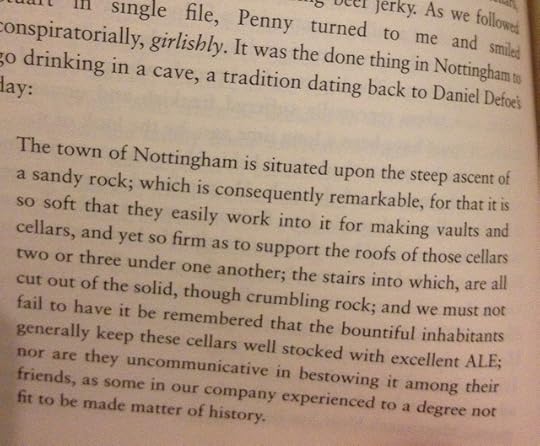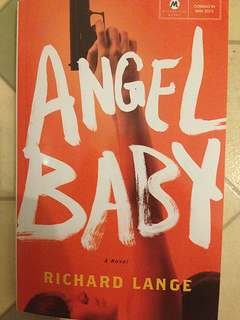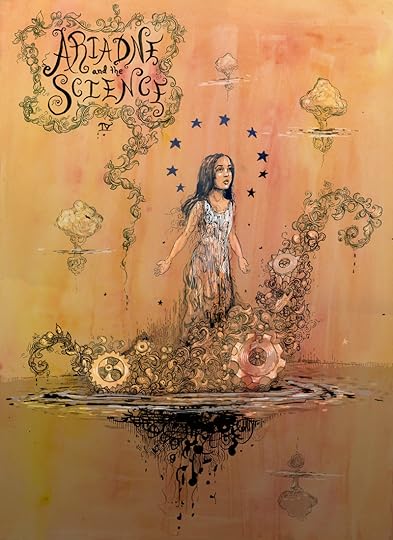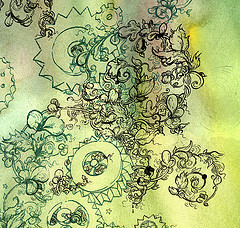Warren Ellis's Blog, page 32
January 9, 2013
booklist 2013: UNDERGROUND ENGLAND, Stephen Smith

UNDERGROUND ENGLAND: Travels Beneath Our Cities and Country, by Stephen Smith. The prose style is frankly a bit arch and somewhat fusty in places, for me, but it’s done with good humour and, as you can see, it’s stuffed with fun things like this. The man is fascinated by what lies beneath, and rattles all over the country (seeming not to stray across the borders, which I find a little sad) in search of caves, tunnels, mines, basements, secret passageways and your general array of holes in the ground. Including, I should note, the underground town built for the Government and the Royal Family in event of nuclear war, named at various times Subterfuge and Site 3. A secret buried town called Subterfuge. How can you not love that?
Not what you’d call a serious exploration of England’s hidden spaces, but an amusing whistlestop tour, thickly littered with interesting pieces of information.
January 7, 2013
GUN MACHINE, Week One
So the book finally launched last week. We had a few hiccups, including physical copies not reaching Barnes & Noble bookstores (at best) in the launch week, and both Amazon and Amazon UK selling out twice, but it’s out there. This link should tell you where to find it. At one point, GUN MACHINE was the 112th best-selling book on Amazon. This weekend has mostly been about people telling me they can’t find physical copies to buy, which is really not a warming thing for someone who would like to sell copies of their book.
Book Trailer 1 was exclusive at MTV Geek (thank you!) for a while, and now it’s on YouTube:
Jim Batt, Ben Templesmith and Wil Wheaton, folks. They did me proud, and it’s not a thing I’ll ever be able to pay back.
The American reviews I’ve been shown have all been very kind. The New York Times reviewed it twice, even. Got one in the UK, yesterday, too, which was nice. I was also on The Nerdist podcast – Chris and his team were just great.
Book Trailer 2 is coming, which will hopefully keep things rolling along. I know it’s going to look amazing.
Last week was mostly about watching screens and processing email (and blasting away my “holiday” time). Today I go back to the actual job of writing things. But if you’re one of the people who tweeted about the book, or blogged about it, over the last week: thank you. Seriously. You made the week a lot easier for me, and I’m grateful.
January 4, 2013
booklist 2013: ANGEL BABY, Richard Lange

This is an early copy (ARC) of ANGEL BABY, the very fun new novel by Richard Lange, out May 2013. Tore through it over Xmas. It’s nothing but muscle and bone, no fat on it at all, a pure strike of American Crime Novel:
Malone is sad looking at her, sad thinking about her life. He should have bought a bottle along. You’ve got to be ready for moments like these, ready to drown your ruined heart as soon as it starts beating again.
The blurb I sent over read
A bone-crushing nightmare parable: bad people doing the wrong things for love.
January 3, 2013
GUN MACHINE Book Trailer 1, by Jim Batt, Ben Templesmith & Wil Wheaton
Get More:
MTV Shows
FAQ 3jan13: On Conservative Characters, Cyberpunk & Women Who Write SF
I’ve been enjoying Crooked Little Vein a lot, but I was wondering what motivated the narrative decision to make your protagonist be (and I hope I’m phrasing this properly) an essentially conservative character. By that I mean he tends to react with hostility to the oddballs his work brings him in contact with, and then defends people who, while seemingly being more socially typical, demonstrate close-mindedness.
The truth, I think, is that most people are essentially conservative characters, and I found it interesting to try and develop a character like that towards some kind of acceptance of the real face of the modern Western world without betraying his basic nature. People can and/or should change during a story, but they shouldn’t transcend into completely new people, especially not in a short book. My note to myself on McGill’s passage through the story was something like “Trix doesn’t magically fuck enlightenment into him.”
Aside from stuff Phillip K. Dick and Neal Stephenson, what’s on your must-read cyberpunk novels and comics list?

Okay. Deep breath.
Cyberpunk, also known as Radical Hard SF or The Movement, was born around 1980 and didn’t survive that decade. (Some people map the end to 1992, with Neal Stephenson’s SNOW CRASH.) Philip K Dick had no affiliation with the movement, and was dead by 1982, two years before William Gibson published NEUROMANCER. People tend to associate Dick with cyberpunk because of BLADE RUNNER, particularly its visuals, which had nothing to do with the novel, but were so strikingly of the speculative zeitgeist that in 1982 William Gibson had to get out of his cinema seat and leave the screening because it looked too much like what was in his head.
Phil Dick was pre-cyberpunk. He, JG Ballard and Alfred Bester were major touchstones for the movement. Ballard’s CRASH and Bester’s STARS MY DESTINATION and THE DEMOLISHED MAN are essential. Also John Brunner’s STAND ON ZANZIBAR, THE SHEEP LOOK UP, and, most importantly for cyberpunk’s ancestry, THE SHOCKWAVE RIDER.
(EDIT to note: yes, and about a hundred others, I’m sure. These are the ones that occurred to me that day.)
Of the cyberpunk period itself, you will need William Gibson’s first trilogy, NEUROMANCER, COUNT ZERO and MONA LISA OVERDRIVE. Also, Bruce Sterling’s THE ARTIFICIAL KID and ISLANDS IN THE NET. Richard Kadrey’s METROPHAGE. Rudy Rucker’s SOFTWARE and WETWARE. Pat Cadigan’s TEA FROM AN EMPTY CUP. That should keep you going for a bit.
I couldn’t help but notice your recommendations of cyberpunk writers a couple days back were all men. Are there any female writers of cyberpunk (or sci-fi) in general you recommend? Are there any that have influenced your own work?

Um, Pat Cadigan is in that list, and she’s female.
A partial, off-the-top-of-my-head list of female speculative fiction writers whose work I’ve liked would include:
Ursula LeGuin, obviously, who’s influenced everybody. Seek out and start off with THE LATHE OF HEAVEN, if you haven’t already.
Pamela Zoline. Carol Emshwiller. Mary Soon Lee (one of the single best short stories in sf in the 00s was her “Pause Time”). CJ Cherryh’s early book DOWNBELOW STATION is warmly remembered.
Doris Lessing’s SHIKASTA had a *huge* effect on me. Very influential, I think.
Cherie Priest, Elizabeth Bear, Cat Valente… I’ve written book blurbs for two of these, and those two have also written on my website, which it suddenly occurs to me you don’t read…!
Kate Wilhelm. Mary Shelley counts. Probably so does Angela Carter, at least in my head.
Lauren Beukes, of course, who is also a friend.
Obviously incomplete and written in two minutes, but a start.
January 2, 2013
ARIADNE AND THE SCIENCE: 4/5 – by Molly Crabapple & Warren Ellis

But what Ariadne discovered on her walks with the Meadow was that there were bigger places to see. The multiverse hangs in the metaverse, a room where all the universes hang like sheets on a great hypermagnetic wave. And the Xenoverse is the weather outside that room that causes the wave. And the Hyperverse is the weather system that causes those winds. And the Hyperverse is the impossibly giant ecology that contains all things. Ariadne, of course, knew as well as you and I that weeds get bloody everywhere. So it was not an impossibly long time before she, in a boat of Meadow, could look down on all of creation and know that everything everywhere was really nothing more than things growing. And she, no less than a clever woman who never learned not to ask questions, did look down, and smiled.
Words by Warren Ellis, pictures by Molly Crabapple.
ARIADNE 4/5 is available as a limited-edition print.
© Warren Ellis & Molly Crabapple 2012
#ariadnescience

January 1, 2013
To A Wyrd 2013
Wyrd is a good old Anglo-Saxon word that may loosely translate as “fatedness.”
“To become.” “That which happens.”
There is strangeness in wyrd, an active supernatural process of destiny. Its descendant word “weird” retained its paranormal context until fairly recently.
I have been listening a great deal, this winter break, to the music of Xenis Emputae Travelling Band, in which I hear a little of the wyrd, in relation to hauntological narrative. We here in this old country remain surrounded by our archaeoacoustics and the myriad layers of our musics. The more I think about the future, somehow, the more present the deep past seems to me.
There’s a wyrd to futurism, or perhaps just a wyrd futurism, out of Charles Fort, where we are looking for the steam-engines just before steam-engine-time comes. The fatedness of future things. The thunderheads of destiny.
Wyrd and the future are where I’m going to be living, this year, I think. Maybe I always was.
Let’s have a good weird year.
This is warren ellis dot com. Hello again.
December 18, 2012
The Social Web: End Of The First Cycle
Twitter alters its terms of access to its information, thereby harming the services that built themselves on that information. Which was stupid, because Twitter gets fewer and fewer material benefits from allowing people to use its water. And why would you build a service that relies on a private company’s assets anyway? Facebook changes its terms of access regularly. It’s broken its own Pages system and steadily grows more invasive and desperate. Instagram, now owned by Facebook, just went through its first major change in terms of service. Which went as badly as anyone who’s interacted with Facebook would expect. As Twitter disconnected itself from sharing services like IFTTT, so Instagram disconnected itself from Twitter. Flickr’s experiencing what will probably be a brief renaissance due to having finally built a decent iOS app, but its owners, Yahoo!, are expert in stealing defeat from the jaws of victory. Tumblr seems to me to be spiking in popularity, which coincides neatly with their hiring an advertising sales director away from Groupon, a company described by Techcrunch last year as basically loansharking by any other name.
This may be the end of the cycle that began with Friendster and Livejournal. Not the end of social media, by any means, obviously. But it feels like this is the point at where the current systems seize up for a bit. Perhaps not even in ways that most people will notice. But social media seems now to be clearly calcifying into Big Media, with Big Media problems like cable-style carriage disputes. Frame the Twitter-Instagram spat in terms of Virginmedia not being able to carry Sky Atlantic in the UK, say (I know there are many more US examples).
Google+, of course, is not, strictly speaking, a social network. Most people can’t see what other people are doing there. Google, of course, sees it all. But everyone knows that going in.
It feels like the social web is going to get somewhat less interesting for a while. Less connected, less engaged.
Twitter’s going to be used for tv ratings in the States now. The clever thing about that it that it serves the same purpose as Facebook Likes: it documents media preferences. These are the things that keep a free service free, of course. But, god, there have to be less banal and creepy ways to do it.
I wonder if anyone’s been thinking twice about giving up their personal websites.
[Instagram: I said on that service earlier that I'll wait and see. Some hours later, they released an update to their TOS that I haven't had a good look at yet. But all my Instagram photos were backed up when Facebook bought them, and that backup auto-updates every time I post.]
FAQ 18dec12: An Angle Of Attack On Writer’s Block
Sir, let me start by saying you are awesome. Thank you very much for giving Transmetropolitan to the masses. My question to you is this: How best do you deal with writer’s/artistic block and what tips would you give anyone going through such annoyances?
I don’t believe there is such a thing. There is only being unable or unwilling to write the thing that’s in front of you, and, consciously or unconsciously, looking for ways to not write it. Some people on the internet argue with me about this sometimes, or denounce me from the cheap seats. All the fucks I give: see if you can detect them.
The trick — and it’s imperfect and can take a while, but — is simply to write something else. Don’t let your hands go cold. Don’t let yourself stop thinking. Shift to something different. I think it was Robert Silverberg who used to do his (type)written correspondence on bad days, and then “trick” himself into writing by slipping manuscript paper into the machine once his fingers were flying.
It’s about letting your backbrain chew on the problems while your frontbrain is amused by the new and shiny things. Find an essay to write. Do some flash fiction, or a short story, or a novelette about dancing gravediggers written in the style of Cormac McCarthy. An audiobook about dirigible vampires who shit sexy babies down chimneys. Whatever. I’ve read of several writers from eras past who would type out passages from their favourite writers, to get a feeling of what it’s like to make sentences like that.
Write something else. Anything else. Either you’ll solve the problem in the background, or get the taste back for what you’re stuck on — or, guess what, maybe that whole thing was dead and you were just shoving electrodes up it to make it twitch in an awful semblance of life the whole time. I mean, that happens. It doesn’t mean you were blocked, it means that you were zapping a big stinky corpse with all your electricity and wondering why it wasn’t sitting up and calling you Mummy. It was dead. Bury it and never speak of what you did to it again.
You’re a writer — or an artist — or you’re not. It sounds harsh, but, seriously, not everyone’s wired for this stupid life. If you think you are, then you have to write around the block. Anything that takes your fancy. Just get words happening. The rest will follow. Best of luck.
December 17, 2012
The Last Station Ident Of 2012, By Sara Gries

Here’s where you find Sara Gries. And here’s where I retire the Station Ident for a while. Good morning, sinners.
Warren Ellis's Blog
- Warren Ellis's profile
- 5767 followers






